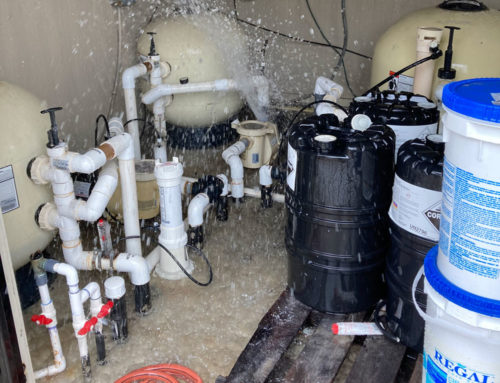
Use Enzyme Treatments to Keep Your Pool Crystal Clear
For commercial pool managers whose pools experience a high swimmer load in mid- and late-summer, enzyme treatments can be very effective in combatting scum build-up and keeping the water clear and sparkling.
What are enzymes?
Enzymes are biological molecules that create chemical reactions. They are helpful in pools because they can break down organic matter, which is often invisible, and transform it into carbon dioxide, or CO2.
How do enzymes do their job?
Scum quickly accumulates in pool water, forming when organic materials — including oils, lotions, fats, detergents, dirt, and pollen — build up on the water’s surface and attract dirt and debris. This collection can form a line on the inside of the pool walls, serving as an unsightly reminder of the contaminants in the water.
Enzyme treatments can be used in pools to help reduce such scum and prevent unattractive foaming. When paired with surfactants, enzymes can also aid in cleaning contaminants from the bottom of the pool. (The surfactants draw contaminants to the surface, where the enzymes can do their work.)
It’s important to break down contaminants before they find their way into your filter, where they can gum up the works. Regular use of enzyme treatments will prolong the life of your filter media and keep your filtration system running more efficiently. Enzyme treatments will also reduce the amount of sanitizer and shocking that you need to employ to keep water clear, and the amount of time your crew needs to spend scrubbing tiles. All of this translates into savings to your bottom line.
Are enzyme treatments fail-safe?
Although enzymes can be a beneficial staple in your pool-cleaning arsenal, remember that many factors can affect their performance, including temperature, water activity, ionic strength, pH changes, and more. Be sure to select the enzyme treatment that best suits your pool’s needs. If you’re uncertain which enzyme treatment to choose, get advice from a professional pool management company, whose experts can point you in the right direction.
Is summer the only time for enzyme treatments?
No. Many commercial pools also find it helpful to treat with enzymes in the fall, winter, and early spring to reduce algae growth, which makes the spring clean-up for summer that much easier.
When investing in an enzyme product, be sure to choose the one that best fits your pool and its environment. By developing a regular treatment schedule, you can help ensure that your pool’s water stays clear all summer long.
At American Pool, we offer a full range of pool maintenance and management services, and we can provide answers to questions you might have about maintaining healthy water quality. Get in touch for more information.





